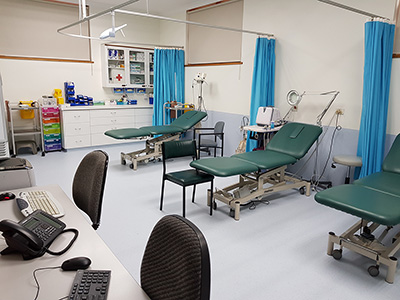Services - Treatment Room Services
Yellow Fever Vaccination Centre
The Surgery is an approved Yellow Fever Vaccination Centre.
Yellow fever vaccinations must be provided at an approved Yellow Fever Vaccination Centre. We provide a vaccination certificate in the form approved and required by WHO.
A single dose of yellow fever vaccine will provide life-long protection against the disease for most people. Travellers should ensure they are vaccinated no less than 10 days before entering the yellow fever risk area, protection against Yellow Fever starts 10 days after vaccination.
On 16 June 2016, the Australian Government adopted the World Health Organisation amendment to the International Health Regulations (2005) regarding the period of protection afforded by yellow fever vaccination, and the term of validity of the certificate. The period of protection and term of validity has changed from 10 years to the life of the person vaccinated. This is based on data demonstrating, for the majority of recipients, a single dose of yellow fever vaccine results in life-long immunity.

Immunisations
Our Nurses provide a comprehensive range of vaccinations. They have qualifications from the Western Australian Department of Health to provide vaccination advice and administer vaccinations. We provide vaccinations funded by State and Federal governments and those only available through private prescriptions.
INR testing (blood-thinning checks)
INR testing (blood thinning checks)
The Surgery provides INR testing within the practice as a service for its patients.
The INR test is used to monitor patients receiving warfarin therapy. Warfarin is used to prevent and treat thrombosis and embolism. However, the therapeutic range of warfarin is narrow and therefore regular testing is required for all patients on warfarin therapy.
Patients are bulk billed for their regular INR consults where the testing is carried out as a discrete procedure.
Heart monitoring (ECG)
An electrocardiogram (ECG) is a medical test that detects cardiac (heart) abnormalities by measuring the electrical activity generated by the heart.
The machine that records the patient’s ECG is called an electrocardiograph. This ECG data is interpreted by one of our doctors. The doctor uses the ECG in order to correctly exclude the presence of heart disease to provide optimal treatment for their patients or to refer them to a cardiologist.
24 Hour Blood Pressure testing
At The Surgery we provide a 24 hour blood pressure testing service for our patients.
Ambulatory blood pressure (ABP) monitoring involves measuring blood pressure (BP) at regular intervals (usually every 20–30 minutes) over a 24 hour period while patients undergo normal daily activities, including sleep.
The portable monitor is worn on a belt connected to a standard cuff on the upper arm (Figure 1) and uses an oscillometric technique to detect systolic, diastolic and mean BP as well as heart rate.
When testing is completed the device is connected to a computer that prepares a report for the doctor. Ambulatory BP monitoring provides a more reliable measure of a patient’s BP than isolated clinic measures and is not subject to the ‘white-coat effect’, which can overestimate BP, particularly in susceptible patients.
Recent recommendations from expert groups such as the United Kingdom’s National Institute for Health and Clinical Excellence strongly advocate wider use of ABP monitoring in the diagnosis and management of hypertension.
The cost to hire the 24 Hour BP machine is $25.
Ankle Brachial Pressure Testing
The Surgery has obtained the latest technology to enable a quick, noninvasive check of your risk of peripheral artery disease (PAD). People with peripheral artery disease are at an increased risk of heart attack, stroke, poor circulation and leg pain.
The test which is very quick to perform will be offered to all our patients with diabetes and other patients at risk including those over the age of 70.
The test is bulk billed.
Iron Infusions
Iron Infusions are now routinely carried out at The Surgery.
An iron infusion is an intravenous solution that is used in the treatment of iron deficiency.
Iron is an essential element required by the body for its oxygen carrying properties and it plays an important role in many other vital processes in the body.
An iron infusion is used when oral supplements and/or iron injections are ineffective or cannot be used. The benefits of iron infusion include rapid delivery of iron and replenishment of iron stores, avoidance of gastrointestinal side effects associated with oral iron, and avoidance of potential flares of inflammatory bowel disease.
Your doctor will explain the benefits and possible risks in detail with you at your appointment.
In addition to the consultation fee charged by your doctor which is fully rebateable, a treatment room fee of $50 will be charged for each attendance. You may need more than one infusion depending upon your blood test results.
Skin Cancer and Skin Lesion Removal
Skin cancer is extremely common in Australia, and early detection is of the utmost importance.
The Surgery is The GP Practice for comprehensive skin checks.
We have the facilities to detect and manage skin cancers. Biopsy and excision of lesions are performed in our treatment rooms. Many skin lesions can also be treated non-invasively with cryotherapy and the application of topical medications such as Aldara cream.
Nurse Assessments for Urgent Needs
On occasion you may have an urgent medical problem that is not an emergency. In these instances we encourage you to contact us for an appointment.
If all our doctors appointments have been booked our nurses who are skilled and experienced to provide assessments will see you in order to assist you to obtain the most appropriate treatment.
The outcome of the nurses assessment might be that you be added onto a doctor’s appointment schedule, or, you may be referred to the Hospital Emergency Department, or, you may be given an appointment to see one of our doctors on another day.
Q Fever Vaccinations
Q fever is a disease caused by infection with the Coxiella burnetii bacteria. It mainly affects people who work with livestock as it can be spread to humans mainly from cattle, sheep and goat. Symptoms are similar to the flu.
Special expertise is required to be able to give Q Fever Vaccinations.
Two appointments are needed exactly one week apart. These appointments are with the same Doctor. The patient must attend on the same day of the week for each appointment.
At the first appointment the doctor takes extensive history to see if patient has had any Q fever ‘like’ illnesses in the past. The patient is given a blood test form to have bloods done within two days of the appointment, and, the doctor performs the skin prick test on the patient’s forearm.
At the second appointment the doctor explains the blood test results; determines the result of the skin test, and makes the decision about whether or not to give the vaccine.
The costs for the services are:
- $175.50 for the Q fever consultation
- $53.50 for the Q fever skin prick test
- $168 for the Q Fever Vaccine.
Payment for the services provided is made after the second appointment.
